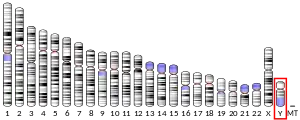EIF1AY
Eukaryotic translation initiation factor 1A, Y-chromosomal is a protein that in humans is encoded by the EIF1AY gene.[5][6]
| EIF1AY | |||||||||||||||||||||||||
|---|---|---|---|---|---|---|---|---|---|---|---|---|---|---|---|---|---|---|---|---|---|---|---|---|---|
| Identifiers | |||||||||||||||||||||||||
| Aliases | EIF1AY, eIF-4C, eukaryotic translation initiation factor 1A, Y-linked, eukaryotic translation initiation factor 1A Y-linked | ||||||||||||||||||||||||
| External IDs | OMIM: 400014 MGI: 1913485 HomoloGene: 100715 GeneCards: EIF1AY | ||||||||||||||||||||||||
| |||||||||||||||||||||||||
| |||||||||||||||||||||||||
| |||||||||||||||||||||||||
| Orthologs | |||||||||||||||||||||||||
| Species | Human | Mouse | |||||||||||||||||||||||
| Entrez | |||||||||||||||||||||||||
| Ensembl | |||||||||||||||||||||||||
| UniProt | |||||||||||||||||||||||||
| RefSeq (mRNA) | |||||||||||||||||||||||||
| RefSeq (protein) | |||||||||||||||||||||||||
| Location (UCSC) | Chr Y: 20.58 – 20.59 Mb | Chr X: 159.37 – 159.39 Mb | |||||||||||||||||||||||
| PubMed search | [3] | [4] | |||||||||||||||||||||||
| Wikidata | |||||||||||||||||||||||||
| |||||||||||||||||||||||||
Like its X-chromosomal counterpart EIF1AX, it encodes an isoform of eukaryotic translation initiation factor 1A (EIF1A). EIF1A is required for the binding of the 43S complex (a 40S subunit, eIF2/GTP/Met-tRNAi and eIF3) to the 5' end of capped RNA. It has one amino acid difference (M50L) from EIF1AX.[6]
References
- GRCh38: Ensembl release 89: ENSG00000198692 - Ensembl, May 2017
- GRCm38: Ensembl release 89: ENSMUSG00000067194 - Ensembl, May 2017
- "Human PubMed Reference:". National Center for Biotechnology Information, U.S. National Library of Medicine.
- "Mouse PubMed Reference:". National Center for Biotechnology Information, U.S. National Library of Medicine.
- Lahn BT, Page DC (Nov 1997). "Functional coherence of the human Y chromosome". Science. 278 (5338): 675–80. doi:10.1126/science.278.5338.675. PMID 9381176.
- "Entrez Gene: EIF1AY eukaryotic translation initiation factor 1A, Y-linked".
Further reading
- Lim J, Hao T, Shaw C, et al. (2006). "A protein-protein interaction network for human inherited ataxias and disorders of Purkinje cell degeneration". Cell. 125 (4): 801–14. doi:10.1016/j.cell.2006.03.032. PMID 16713569.
- Gerhard DS, Wagner L, Feingold EA, et al. (2004). "The Status, Quality, and Expansion of the NIH Full-Length cDNA Project: The Mammalian Gene Collection (MGC)". Genome Res. 14 (10B): 2121–7. doi:10.1101/gr.2596504. PMC 528928. PMID 15489334.
- Fortna A, Kim Y, MacLaren E, et al. (2006). "Lineage-Specific Gene Duplication and Loss in Human and Great Ape Evolution". PLoS Biol. 2 (7): E207. doi:10.1371/journal.pbio.0020207. PMC 449870. PMID 15252450.
- Agate RJ, Choe M, Arnold AP (2004). "Sex differences in structure and expression of the sex chromosome genes CHD1Z and CHD1W in zebra finches". Mol. Biol. Evol. 21 (2): 384–96. doi:10.1093/molbev/msh027. PMID 14660691.
- Skaletsky H, Kuroda-Kawaguchi T, Minx PJ, et al. (2003). "The male-specific region of the human Y chromosome is a mosaic of discrete sequence classes". Nature. 423 (6942): 825–37. doi:10.1038/nature01722. PMID 12815422.
- Marintchev A, Kolupaeva VG, Pestova TV, Wagner G (2003). "Mapping the binding interface between human eukaryotic initiation factors 1A and 5B: A new interaction between old partners". Proc. Natl. Acad. Sci. U.S.A. 100 (4): 1535–40. doi:10.1073/pnas.0437845100. PMC 149867. PMID 12569173.
- Strausberg RL, Feingold EA, Grouse LH, et al. (2003). "Generation and initial analysis of more than 15,000 full-length human and mouse cDNA sequences". Proc. Natl. Acad. Sci. U.S.A. 99 (26): 16899–903. doi:10.1073/pnas.242603899. PMC 139241. PMID 12477932.
This article is issued from Wikipedia. The text is licensed under Creative Commons - Attribution - Sharealike. Additional terms may apply for the media files.






